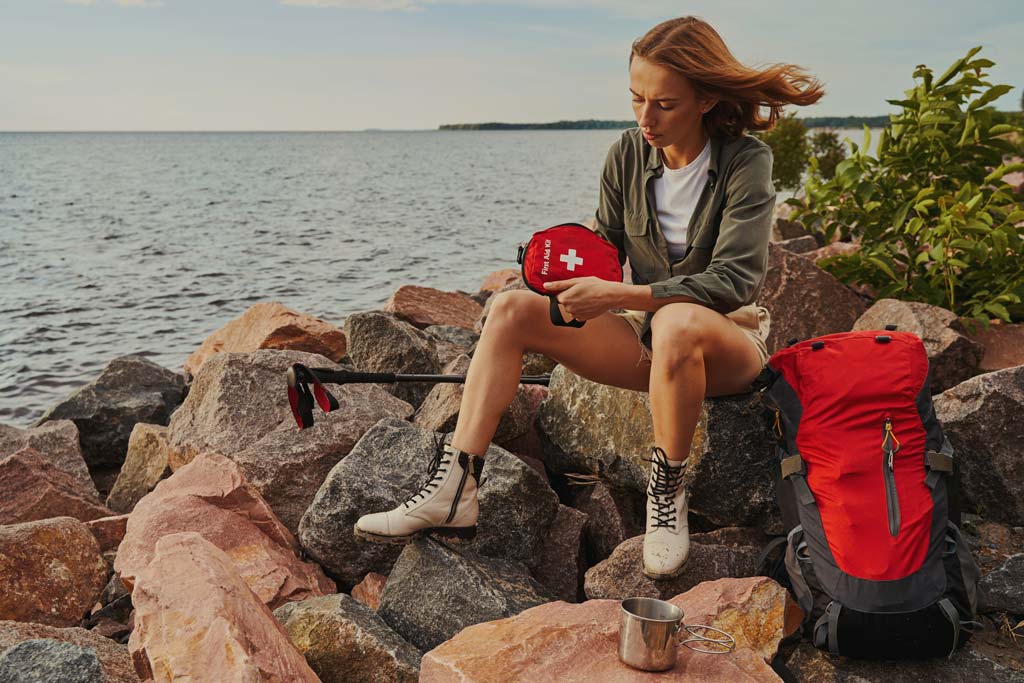Traveling is exciting, but it’s important to be prepared for any medical emergencies that might arise. A little preparation can go a long way in keeping you and your loved ones safe. Here are some essential first aid tips for travelers to help handle emergencies away from home.
Pack a Comprehensive First Aid Kit
One of the most important travel preparations is packing a travel first aid kit. Having the right supplies on hand can make a big difference. Here are some travel first aid kit essentials:
- Adhesive bandages of various sizes
- Sterile gauze pads and adhesive tape
- Antiseptic wipes and antibiotic ointment
- Scissors and tweezers
- Pain relievers like ibuprofen or acetaminophen
- Hand sanitizer and insect repellent
- Aloe vera gel for minor burns
- Hydrocortisone cream for itching and skin irritations
- Any personal medications and copies of prescriptions
Note that even a basic first aid kit that you can carry in a pocket on an excursion is better than no first aid kit at all.
Be Prepared for Allergic Reactions
Allergic reactions can happen anywhere, especially in new environments. If you or a travel companion have severe allergies, always carry an epinephrine auto injector—it’s an essential part of first aid for travel, if you have allergies. Make sure it’s easily accessible and that everyone in your group knows how to use it. For less severe reactions, antihistamines can be very helpful.
Handle Minor Injuries Effectively
Scrapes, cuts, and blisters are common while traveling. To prevent infection, clean any wound with antiseptic wipes and apply antibiotic ointment. Cover with a sterile bandage. For minor burns, cool the area with running water and apply aloe vera gel to soothe the skin.
Insect Bites and Stings
Insect bites can be more than just annoying; they can sometimes lead to serious infections. Use insect repellent to avoid bites in the first place. If you do get bitten, clean the area with antiseptic wipes and apply hydrocortisone cream to reduce itching and swelling.

Prepare for Specific Medical Conditions
If you have pre-existing medical conditions, consult with your doctor before traveling. Make sure you have an adequate supply of your medications and carry a list of these medications in your first aid kit for traveling. Knowing where the nearest medical facilities are at your destination can save precious time during an emergency.
Treating Common Travel Ailments
Here are some tips for treating common ailments while traveling:
- Dehydration: Drink plenty of water, especially in hot climates. Oral rehydration salts can be helpful if you’re dehydrated.
- Motion Sickness: Carry motion sickness tablets and consider wearing acupressure bands.
- Stomach Issues: Over-the-counter anti-diarrheal medication and antacids can help manage symptoms.
Be Ready for Major Medical Emergencies
Knowing how to respond to medical emergencies is crucial. If someone in your group suffers a severe injury or illness, here are the steps to take:
- Stay calm and assess the situation.
- Call for emergency medical help immediately.
- Provide first aid while waiting for professional help.
- Know basic CPR techniques, as they can be lifesaving in critical situations.
Keep Hygiene a Priority
Maintaining good hygiene can prevent many travel-related illnesses. Always carry hand sanitizer and use it before eating or after touching surfaces in public areas. This simple habit can significantly reduce your risk of infections.
Seek Medical Care When Necessary
Sometimes, first aid isn’t enough. If you’re dealing with a serious condition or injury, don’t hesitate to seek professional medical care. Knowing the location of local hospitals or clinics at your destination is a crucial part of your travel planning.
The Bottom Line
Traveling should be fun and stress-free, but being prepared for medical emergencies is essential. With these first aid tips and a well-stocked travel first aid kit, you’ll be ready to handle most minor and some major health issues that come your way. Remember, the best way to enjoy your trip is to stay safe and healthy. Happy travels!

